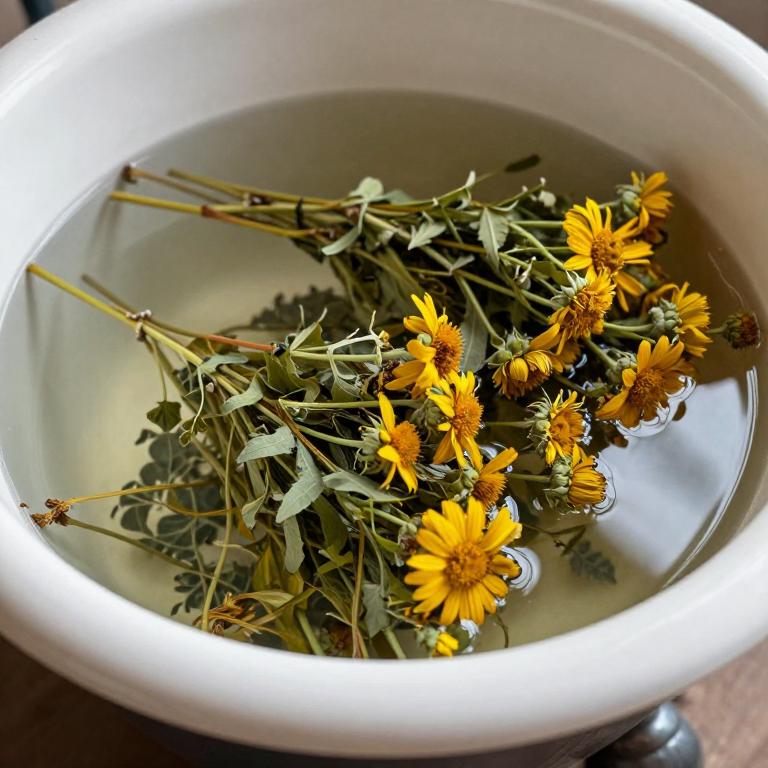10 Best Herbal Baths For Neuritis

Herbal baths can be a soothing and therapeutic remedy for individuals suffering from neuritis, a condition characterized by inflammation of the nerves.
Certain herbs, such as chamomile, lavender, and eucalyptus, are known for their anti-inflammatory and calming properties, making them ideal for inclusion in bath water. Soaking in a warm herbal bath helps to relax the muscles, reduce pain, and improve blood circulation, which can aid in nerve healing. To prepare an herbal bath, steep a handful of dried herbs in hot water for 15-20 minutes, then add the infused water to a bathtub filled with warm water.
It is recommended to use this treatment regularly, ideally 2-3 times a week, for best results, though consulting with a healthcare provider is advisable before starting any new therapy.
Table of Contents
- 1. St. john's wort (Hypericum perforatum)
- 2. Stinging nettle (Urtica dioica)
- 3. Mountain arnica (Arnica montana)
- 4. Field horsetail (Equisetum arvense)
- 5. Salvia (Salvia officinalis)
- 6. German chamomile (Chamomilla recutita)
- 7. English lavender (Lavandula angustifolia)
- 8. Yarrow (Achillea millefolium)
- 9. Blessed thistle (Cnicus benedictus)
- 10. Rosemary (Rosmarinus officinalis)
1. St. john's wort (Hypericum perforatum)

Hypericum perforatum, commonly known as St. John's Wort, has been traditionally used in herbal baths to support the treatment of neuritis, an inflammation of the nerves often accompanied by pain and tingling.
When infused into bathwater, the active compounds in St. John's Wort, such as hyperforin and hypericin, may help reduce nerve inflammation and soothe discomfort. The warm water enhances the absorption of these compounds through the skin, potentially offering localized relief without the systemic side effects of oral medications. Herbal baths with St. John's Wort are often recommended as a complementary therapy to conventional treatments for neuritis.
However, individuals should consult a healthcare provider before using St. John's Wort, as it can interact with certain medications and may not be suitable for everyone.
2. Stinging nettle (Urtica dioica)

Urtica dioica, commonly known as stinging nettle, has been traditionally used in herbal baths to alleviate symptoms of neuritis, an inflammation of the nerves.
The plant contains anti-inflammatory and analgesic compounds such as histamine, formic acid, and flavonoids, which may help reduce nerve irritation and pain. To prepare a nettle bath, fresh or dried leaves are boiled and then soaked in warm water, allowing the active components to infuse into the solution. Soaking in this bath for 15 to 30 minutes can provide soothing relief and promote healing by improving circulation and reducing swelling.
While generally safe, individuals with sensitive skin should test the bath on a small area first to avoid irritation.
3. Mountain arnica (Arnica montana)

Arnica montana herbal baths are a traditional remedy often used to alleviate the symptoms of neuritis, a condition characterized by inflammation and pain in the nerves.
The active compounds in arnica, such as helenalin and other sesquiterpene lactones, are believed to have anti-inflammatory and analgesic properties that can help reduce nerve irritation and swelling. When used in a warm bath, arnica montana can be absorbed through the skin, providing localized relief without the systemic effects of oral medications. However, it is important to note that arnica should not be applied to broken or sensitive skin, and individuals with allergies or certain medical conditions should consult a healthcare provider before use.
Overall, arnica montana baths may serve as a complementary therapy to support healing in cases of neuritis when used appropriately.
4. Field horsetail (Equisetum arvense)

Equisetum arvense, commonly known as field horsetail, has been traditionally used in herbal baths for its high concentration of silica and other minerals that may support nerve health.
When used in warm water baths, the compounds in equisetum arvense may help reduce inflammation and soothe the affected nerves, making it a potential remedy for neuritis. The anti-inflammatory and astringent properties of the plant are believed to promote healing and alleviate pain associated with nerve inflammation. Herbal baths with equisetum arvense are often prepared by steeping the dried plant material in water before adding it to a bath, allowing the skin to absorb its beneficial properties.
While it is considered a complementary therapy, it is advisable to consult a healthcare professional before using equisetum arvense for neuritis, especially if other medical treatments are involved.
5. Salvia (Salvia officinalis)

Salvia officinalis, commonly known as sage, has been traditionally used in herbal baths to support the treatment of neuritis, an inflammation of the nerves.
The essential oils and compounds found in sage, such as thujone and camphor, possess anti-inflammatory and antiseptic properties that may help reduce nerve irritation and promote healing. When infused into warm water, sage baths can provide a soothing effect, easing pain and discomfort associated with neuritis. These baths are often recommended as a complementary therapy to conventional treatments, offering a natural approach to nerve health.
However, it is important to consult with a healthcare professional before using sage baths, especially for individuals with sensitive skin or underlying medical conditions.
6. German chamomile (Chamomilla recutita)

Chamomilla recutita, commonly known as German chamomile, has been traditionally used in herbal baths for its soothing and anti-inflammatory properties, which may offer relief for individuals suffering from neuritis.
The essential oils in chamomile, such as bisabolol and chamazulene, possess calming effects that can help reduce nerve irritation and inflammation associated with neuritis. When used in a warm bath, chamomile can promote relaxation and improve blood circulation, potentially aiding in the healing process. However, it is important to consult with a healthcare professional before using chamomile baths, especially for those with sensitive skin or allergies.
While herbal baths may provide symptomatic relief, they should not replace conventional medical treatments for neuritis.
7. English lavender (Lavandula angustifolia)

Lavandula angustifolia, commonly known as English lavender, has been traditionally used in herbal baths to soothe inflammation and promote relaxation.
The essential oils in lavender contain compounds like linalool and linalyl acetate, which possess anti-inflammatory and analgesic properties that may help reduce the symptoms of neuritis. When infused into bath water, lavender can provide a calming effect, easing muscle tension and improving circulation, which supports nerve healing. Herbal baths with lavender are often recommended as a complementary therapy for individuals suffering from nerve-related conditions.
However, it is important to consult with a healthcare professional before using lavender baths, especially for those with sensitive skin or existing medical conditions.
8. Yarrow (Achillea millefolium)

Achillea millefolium, commonly known as yarrow, has been traditionally used in herbal baths to alleviate symptoms of neuritis due to its anti-inflammatory and analgesic properties.
When infused into bath water, yarrow can help reduce nerve inflammation and soothe painful sensations associated with neuritis. The essential oils and flavonoids present in yarrow contribute to its ability to improve circulation and ease nerve irritation. To prepare the bath, a handful of dried yarrow herb is steeped in hot water for several minutes before being added to warm bath water.
Regular use of yarrow herbal baths may provide natural relief for individuals suffering from neuritis, though it is advisable to consult a healthcare professional before starting any new treatment.
9. Blessed thistle (Cnicus benedictus)

Cnicus benedictus, also known as blessed thistle, has been traditionally used in herbal baths to alleviate symptoms of neuritis, an inflammatory condition affecting the nerves.
The plant contains compounds such as sesquiterpene lactones and flavonoids, which may possess anti-inflammatory and analgesic properties that support nerve health. To prepare a herbal bath, dried blessed thistle is steeped in hot water and then added to warm bath water, allowing the skin to absorb its beneficial compounds. While there is limited scientific research on its efficacy for neuritis, many users report reduced pain and inflammation after regular use.
As with any herbal remedy, it is advisable to consult a healthcare professional before incorporating blessed thistle baths into a treatment regimen.
10. Rosemary (Rosmarinus officinalis)

Rosmarinus officinalis, commonly known as rosemary, has been traditionally used in herbal baths to alleviate symptoms of neuritis, an inflammation of the nerves often causing pain and tingling.
The essential oils in rosemary, particularly 1,8-cineole and camphor, possess anti-inflammatory and analgesic properties that may help reduce nerve irritation and promote healing. When infused into warm water, rosemary herbal baths can provide a soothing effect, enhancing circulation and reducing muscle tension around affected nerves. This natural remedy is often recommended as a complementary therapy alongside conventional treatments for neuritis.
However, it is important to consult a healthcare professional before using rosemary baths, especially for individuals with sensitive skin or underlying health conditions.